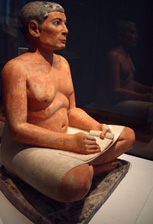 The Art of Good Writing
The Art of Good Writing The Art of Good Writing
The Art of Good Writing
John Kenneth Galbraith and the influence of Henry Luce.
 I was an editor of Fortune under Henry Luce, the founder of Time, Inc., who was one of the most ruthless editors that I have ever known, that anyone has ever known. Henry could look over a sheet of copy and say, "This can go, and this can go, and this can go," and you would be left with eight to ten lines which said everything that you had said in twenty lines before.
I was an editor of Fortune under Henry Luce, the founder of Time, Inc., who was one of the most ruthless editors that I have ever known, that anyone has ever known. Henry could look over a sheet of copy and say, "This can go, and this can go, and this can go," and you would be left with eight to ten lines which said everything that you had said in twenty lines before.
And I can still, to this day, not write a page without the feeling that Henry Luce is looking over my shoulder and saying, "That can go."
John Kenneth Galbraith: Ph.D. UC Berkeley in Agricultural Economics in 1934; Professor of Economics at Harvard for more than fifty years; writer and author of more than 20 books, including The New Industrial State and The Affluent Society, and one novel, The Triumph; price czar during World War II; Project Director in the strategic bombing studies after World War II; editor at Fortune magazine; advisor to President Kennedy; U.S. Ambassador to India during the Kennedy administration; a leader in the antiwar movement during the Vietnam War; past president of the American Economics Association.
Writer's One | Writer's 2 | texts & writing | structure for writing | criteria